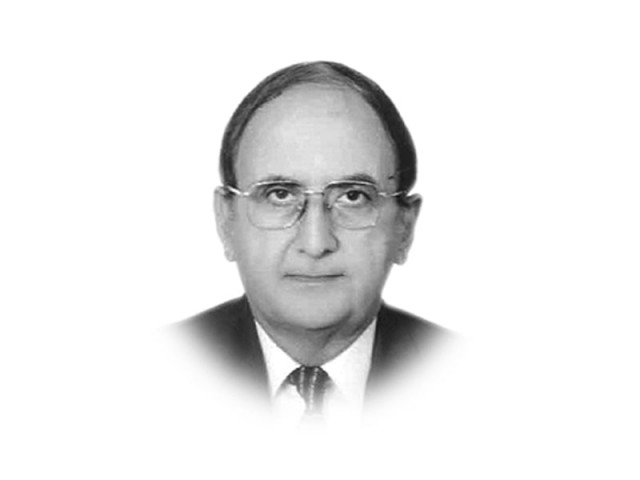The politics of Senate elections
It is going to be an interesting competition between the PPP and the PML-N. Can they continue as allies?

The writer is an independent political and defence analyst. He is also the author of several books, monographs and articles on Pakistan and South Asian affairs
Two developments distinguish the 2015 Senate elections from the earlier ones. First, voting in the Khyber-Pakhtunkhwa (K-P) Assembly was disrupted and delayed for some hours. This was an unusual event because the voters were members of the provincial assembly who created a noisy and difficult situation that is sometimes witnessed in the general elections where ordinary people vote. There were complaints that some members had put white slips in the ballot box and took their vote sheets outside for giving it to their party bosses that were later put into the ballot box by some fully trusted voters along with their own votes. At the time of counting, a few blank slips were discovered from the ballot box, giving credibility to this complaint.
Second, a presidential ordinance was issued on the advice of the prime minister on the eve of the voting day that changed the voting procedure for the Fata members of the National Assembly. This was a violation of the electoral laws that disallow changes in election procedures after the election schedule is announced. Taking cover of a constitutional provision for the elections from Fata, the ruling PML-N engaged in what can be described as election malpractice. It seems that when the PML-N leadership realised that it does not have the support of most Fata MNAs, it changed the procedures to limit the gains of the opposition. What appears more ironic is that the Election Commission of Pakistan (ECP) did not take a strong exception to the change of rules at the last moment and only sought a clarification from the government. The Senate elections from Fata were postponed. The ECP, having the final authority to hold the elections, should have ordered the voting by the Fata MNAs on the basis of the pre-ordinance rules.
The Senate was established in Pakistan under the 1973 Constitution, replacing the practice of a single-house parliament in the 1956 and the 1962 constitutions. The two Constituent Assemblies (1947 and 1956) and the interim 1956-58 National Assembly also had a single house. The Senate provides equal representation to the provinces and some seats are allocated to the capital city of Islamabad as well as Fata. The first Senate in 1973 had 45 members (10 from each province, three from Fata and two from Islamabad). Its strength was raised to 63 in 1977, 87 in 1985 and 100 in 2002. The Eighteenth Amendment of 2010 added four reserved seats for non-Muslims that became operational in the 2012 Senate elections. Today the Senate comprises 104 members.
The principal reason for the establishment of the Senate is to provide equal representation to all provinces and enable politicians and societal leaders with long years of legislative and public service experience and people of excellence to enter the legislative process through indirect elections as a number of such senior people avoid contesting general elections. It is expected that these ‘experienced’ people will add sobriety and maturity to the legislative and governmental processes. However, Pakistan’s experience suggests that the Senate has not been able to perform such a job. A large number of its members do not represent excellence in their professions or in public service. Some have a limited experience of legislative work in provincial or national assemblies. Political parties use this house to accommodate their favourites which is akin to the distribution of patronage.
The notion of equal representation of provinces gets compromised by the practice of getting the people of one province elected from another province where a particular party has a comfortable majority in the provincial assembly. The PML-N adopted this strategy to get outsiders elected from Islamabad and Punjab.
There were no surprises in Punjab and Sindh where the dominant parties got all the seats, i.e., the PML-N in Punjab and the MQM and the PPP in Sindh. However in Punjab, the PPP candidate got more votes than expected, showing that some alienated PML-N members voted for him. In Balochistan, it was a free for all election. The province-based political parties supported one another at the expense of the PML-N that had the largest number of members in the provincial assembly and was also a partner in the provincial coalition government. Six political parties and an independent member won the seats while the PML-N got only three seats. It was also a mixed bag in K-P because no political party had an absolute majority in the provincial assembly. Six political parties shared the seats with the PTI (ruling party) capturing six seats.
The PPP and the PML-N, with 27 and 26 seats respectively, will be competing bitterly for the positions of chairman and deputy chairman of the Senate. Smaller parties like the MQM, the ANP, the JUI-F and the independents will hold the balance. The PPP Co-Chairman, Asif Ali Zardari, is known for his skills of coalition-building. His party stands a good chance of clinching the chairmanship. However, Nawaz Sharif has an advantage because he presides over the federal government, enabling him to use state patronage to secure support. It is going to be an interesting competition between the PPP and the PML-N. However, as these two parties have been helping each for the last year, they may decide to divide the posts of chairman and deputy chairman between them. In any case, there will be interesting political fireworks in Islamabad in March. Can the PPP and the PML-N continue as allies?
Published in The Express Tribune, March 9th, 2015.
Like Opinion & Editorial on Facebook, follow @ETOpEd on Twitter to receive all updates on all our daily pieces.














COMMENTS
Comments are moderated and generally will be posted if they are on-topic and not abusive.
For more information, please see our Comments FAQ